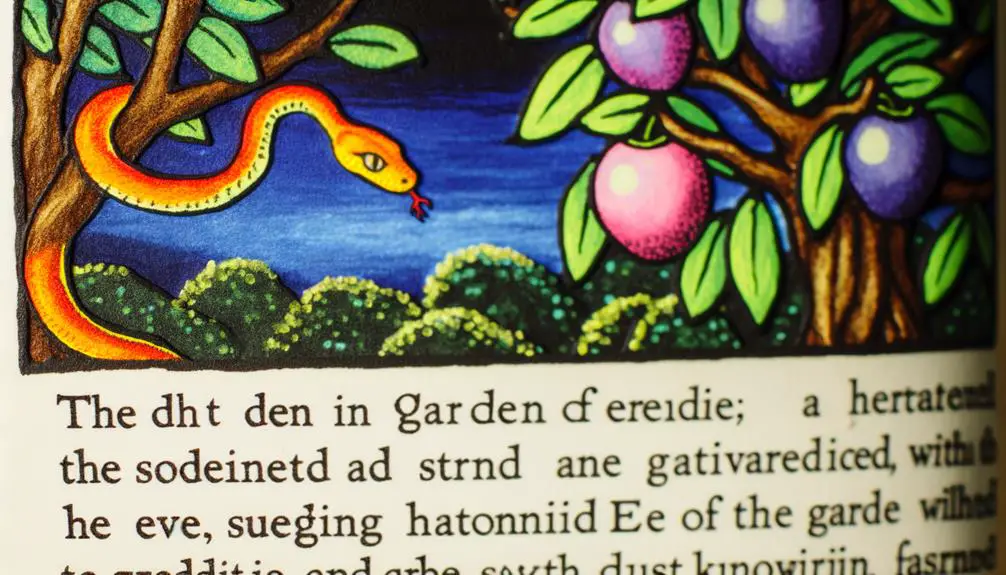Kneading deceit and wisdom, 'Define Guile in the Bible' unravels the complex layers of cunning in scripture, inviting a deeper exploration.

Define Guile in the Bible
Just as the serpent wove a web of deceit in the Garden of Eden, guile threads through the narrative of the Bible, embodying cunning and deception.
You'll find that the concept of guile, while seemingly straightforward, holds layers of complexity when viewed through the lens of biblical stories and teachings.
It's not just about the acts of deceit but also about the spirit behind those actions and the consequences they bear.
As you explore the essence of guile and its manifestations throughout the biblical text, you'll uncover a rich tapestry of lessons on sincerity, wisdom, and the stark contrast between them.
This journey promises to offer you a deeper understanding of not only biblical teachings but also the implications of guile in your own life.
Key Takeaways
- Guile in the Bible represents deceit or cunning used to trick others, often viewed negatively.
- Biblical narratives, such as the serpent in Genesis, illustrate guile's potential to disrupt harmony and trust.
- Unlike guile, wisdom in the Bible is associated with truth, ethical conduct, and integrity.
- Overcoming guile involves sincerity, embracing God's Word, and fostering transparent relationships.
The Essence of Guile

At its core, guile in the Bible signifies a form of deceit or cunning that's often employed with the intention to trick or mislead others. Delving into guile's origin within biblical contexts provides a deeper understanding of its nuanced connotations and the implications it has had throughout history. This concept, while seemingly straightforward, is imbued with layers of cultural and ethical significance that have shaped its perception and interpretation across different societies.
Guile's origin in biblical texts is often associated with the subtlety and craftiness that characters employ to achieve their ends, whether for righteous or nefarious purposes. This duality presents a complex ethical landscape where the morality of guile is frequently debated. It's crucial to recognize that guile, in its essence, doesn't inherently possess a moral quality; rather, it's the intentions and outcomes of the actions taken under guile's guise that are subject to moral scrutiny.
Cultural perceptions of guile have evolved significantly over time. In ancient times, guile was sometimes viewed as a necessary skill for survival and success, especially in contexts where direct confrontation or honesty wasn't feasible or could lead to detrimental outcomes. However, as societies developed more structured ethical and legal systems, the reliance on and acceptance of guile diminished. In contemporary times, guile is often frowned upon, especially within religious communities that prioritize honesty and integrity.
This nuanced understanding of guile's origin and its varied cultural perceptions highlights the complexity of interpreting and applying biblical teachings on deceit and cunning in a modern context.
Guile in Genesis: The Serpent's Deceit

Reflecting on the nuanced interpretations of guile, it's crucial to examine its manifestation in Genesis, where the serpent famously employs deceit to fulfill its objectives. This episode is pivotal, illustrating the serpent's cunning approach to manipulate Eve, appealing to her curiosity and exploiting her desires. The serpent's guile, in this context, isn't merely deceit but a strategic manipulation of truth to serve its own ends. The symbolism of the serpent and the exploitation of Eve's curiosity are central themes in understanding the nature of guile in this biblical narrative.
To grasp the depth of guile in Genesis, consider the following points:
- Serpent Symbolism: The serpent is a complex symbol, often associated with wisdom but also deceit. In Genesis, its cunning nature exemplifies the use of guile to achieve one's goals, highlighting the dual aspects of wisdom and manipulation.
- Eve's Curiosity: The serpent's strategy hinges on exploiting Eve's inherent curiosity and desire for knowledge. This illustrates how guile often preys on genuine desires, twisting them for nefarious purposes.
- Manipulation of Truth: The serpent's deceit involves a subtle distortion of God's words, suggesting that consequences for disobedience won't ensue. This manipulation of truth reveals the essence of guile: deception cloaked in half-truths.
- Impact of Deceit: The outcome of the serpent's guile isn't just the fall of man but a profound disruption of the initial harmony in Eden. This demonstrates the far-reaching consequences of guile, affecting not just the immediate victims but the natural order itself.
Analyzing the serpent's deceit in Genesis offers valuable insights into the nature of guile, underscoring its complexity and the intricate ways it weaves through human interactions.
Examples of Guile Throughout the Bible

Exploring the Bible reveals numerous instances where guile plays a pivotal role in shaping events and characters' destinies, from the cunning Jacob deceiving his father Isaac, to the strategic Rahab misleading the king's men in Jericho. These narratives not only highlight the complexity of human behavior but also underscore the nuanced moral landscape within biblical teachings.
Character |
Instance of Guile |
|---|---|
Jacob |
Deceives Isaac to obtain Esau's blessing. |
Rahab |
Misleads the king's men about the Israelite spies. |
David |
Uses strategy and deceit in warfare and personal encounters. |
Delilah |
Tricks Samson into revealing the secret of his strength. |
In these examples, you'll see that guile serves various purposes, from survival and protection to achieving personal gains or fulfilling divine mandates. The case of Jacob, for instance, is fascinating as it involves familial deception that ultimately fulfills a prophetic destiny. Similarly, Rahab's lie is a complex act of faith, saving her family by aligning with God's chosen people.
David's strategy in dealing with enemies and navigating the political landscape of his time illustrates how guile can be employed in leadership and warfare, blending wisdom with deceit for greater goals. Meanwhile, Delilah's seduction of Samson underscores the personal and national consequences of guile when used for selfish ends.
These narratives compel readers to consider the multifaceted role of guile in human interaction and divine plans. They reveal that in the biblical context, guile is neither wholly condemned nor celebrated but is intricately woven into the fabric of human history and divine interaction.
Guile Vs. Wisdom: Understanding the Difference

You'll find that guile and wisdom are fundamentally distinct in their nature and impact within biblical contexts.
Guile's deceptive nature contrasts sharply with wisdom's pure essence, which seeks to enlighten rather than mislead.
Understanding this difference is crucial for interpreting biblical teachings and their application to ethical living.
Guile's Deceptive Nature
Guile, characterized by its deceptive nature, starkly contrasts with wisdom, which thrives on honesty and insight. Understanding guile involves recognizing its reliance on deceptive tactics and cunning strategies, often employed to manipulate or deceive others.
Here are key aspects to consider:
- Deceptive Tactics: Guile employs misleading or dishonest measures to achieve its ends, diverging from the truth.
- Cunning Strategies: It involves clever but unethical plans to outwit or trick others.
- Manipulation: Guile manipulates facts and situations to serve one's interests, often at the expense of others.
- Contrast to Wisdom: Unlike wisdom, which is based on knowledge, integrity, and ethical conduct, guile is rooted in deceit and selfish ambition.
Wisdom's Pure Essence
While guile thrives on deceit, wisdom's essence lies in its purity and commitment to truth.
You'll find that wisdom, as depicted in biblical contexts, isn't merely about knowledge or intelligence; it's deeply rooted in pure intentions and a steadfast dedication to living a life aligned with truth.
This contrasts sharply with guile, which manipulates and deceives for personal gain.
Wisdom's application in your life demands an honest appraisal of situations, devoid of any intention to deceive others. It calls for a reflection that goes beyond superficial understanding, seeking instead to apply knowledge in ways that foster growth, understanding, and kindness.
In essence, wisdom's pure nature encourages you to act with integrity, making choices that reflect a profound respect for truth and moral clarity.
The Consequences of Guile

In exploring the consequences of guile within biblical narratives, it becomes evident that deceit not only disrupts relationships but also leads to divine retribution. The stories woven throughout sacred texts vividly illustrate guile's punishment and underscore the importance of the repentance process. This intricate dance between deceit and its repercussions highlights a foundational moral framework, emphasizing sincerity and truthfulness as virtues of the highest order.
To further understand the multifaceted consequences of guile, consider the following points:
- Immediate Personal Consequences: Individuals who employ guile often face immediate repercussions. These can range from loss of trust among peers to the fracturing of familial bonds. The immediate fallout serves as a direct reflection of guile's corrosive nature on personal relationships.
- Divine Retribution: Beyond the earthly ramifications, the scriptures detail how guile invites divine retribution. This punishment from a higher power underscores the gravity of deceit in the eyes of the divine, painting it as an offense not just against individuals, but against the moral order itself.
- Community Disruption: Acts of guile extend their impact beyond the immediate parties involved, often sowing discord within larger communities. This disruption can manifest as collective mistrust, undermining the cohesion and moral fiber of the community.
- Repentance and Redemption: Despite the severe consequences of guile, biblical narratives also emphasize the possibility of redemption through repentance. This process involves acknowledging one's deceit, seeking forgiveness, and committing to a path of sincerity and truthfulness.
Jesus and the Teaching of Sincerity

Turning our attention to the New Testament, we observe Jesus embodying and teaching the paramount value of sincerity, starkly contrasting with the destructive nature of guile explored previously. Through His words and actions, Jesus champions heart purity and authentic living as foundational principles for His followers. This emphasis on sincerity not only serves as a corrective to the deceitfulness identified in prior discussions but also elevates the conversation to the realm of spiritual and moral integrity.
Jesus' teachings frequently highlight the importance of an inner life free from deceit. For instance, in the Sermon on the Mount, He advocates for a righteousness that surpasses the external observances of the law, pointing instead to a kind of heart purity that eschews hypocrisy. This call to authentic living underlines Jesus' message that true spirituality isn't about outward appearances but about the condition of one's heart.
Furthermore, Jesus' interactions with individuals often reveal His disdain for superficiality and pretense. He consistently challenges the religious leaders of His time, the Pharisees, for their focus on external religious practices while neglecting the weightier matters of the law: justice, mercy, and faithfulness. His critique of their behavior underscores His advocacy for a life of sincerity, unmarred by guile.
In essence, Jesus' teachings and life provide a compelling blueprint for authentic living. By prioritizing heart purity and sincerity, He sets forth a vision of life that's deeply at odds with guile and deceit, offering instead a path marked by truth and integrity.
Overcoming Guile: Biblical Perspectives

How does the Bible guide believers in overcoming guile, presenting strategies that foster a life of transparency and integrity? The Scriptures provide a blueprint for identifying guile and cultivating sincerity in one's life. This approach not only enhances personal spiritual growth but also strengthens communal bonds within the faith community.
Here are four key strategies derived from biblical teachings:
- Guile Identification through Self-Examination: The Bible encourages believers to engage in regular self-examination, ensuring their actions and motives align with God's will (2 Corinthians 13:5). This introspection aids in identifying and addressing any deceitfulness in one's heart.
- Sincerity Cultivation through Prayer: Prayer is a pivotal means of cultivating sincerity. By communicating openly with God, believers can seek the strength and wisdom to remove guile from their lives (Philippians 4:6-7).
- Embracing God's Word for Moral Guidance: The Scriptures are a rich source of moral guidance, offering insights into living a life devoid of deceit (Psalm 119:11). By internalizing God's Word, believers can fortify their hearts against guile.
- Fostering Transparent Community Relationships: The New Testament emphasizes the importance of sincere relationships within the faith community (Ephesians 4:25). By practicing honesty and transparency with one another, believers can create an environment where guile is easily recognized and addressed.
These strategies underscore the Bible's comprehensive approach to overcoming guile. Through guile identification and sincerity cultivation, believers are equipped to lead lives that reflect God's truth and integrity.
Reflections on Guile for Modern Believers

You must consider how guile's presence in contemporary society challenges your integrity and spiritual resilience. Evaluating biblical teachings offers a framework for identifying and countering deceit in your daily interactions.
This reflection necessitates a critical examination of both personal and communal responses to guile, aiming for a life led more authentically in line with scriptural principles.
Guile's Impact Today
In today's world, guile's influence continues to challenge believers, pushing them to examine the authenticity of their faith and interactions. The prevalence of guileful leadership and societal norms that often prioritize cunning over honesty presents a complex landscape for modern believers. Here's how:
- Guileful Leadership: Navigating environments where leaders may not always prioritize truth.
- Societal Norms: Confronting the acceptance of deceit as a means to an end.
- Personal Integrity: Maintaining honesty in a world that often rewards the opposite.
- Community Influence: The role of believers in setting examples of integrity within their circles.
Understanding and responding to guile's impact requires a deep reflection on these aspects, encouraging a pursuit of truth and integrity in today's complex societal fabric.
Applying Biblical Lessons
Reflecting on guile's pervasive presence in today's society prompts believers to seek guidance from biblical teachings on navigating deceit with integrity. The scriptures offer profound insights into making ethical decisions and provide moral guidance in a world where truth often blurs with falsehood. As you confront daily dilemmas, the Bible's teachings on guile encourage a path of honesty and transparency.
Biblical Principle |
Modern Application |
|---|---|
Speak truth in love |
Foster honest relationships |
Reject false witness |
Uphold integrity in communication |
Walk in the light |
Make transparent decisions |
Love your neighbor |
Practice empathy in conflict |
These principles serve as a compass for believers, guiding them towards actions that reflect the heart of biblical teachings on guile.
Frequently Asked Questions
How Do Different Translations of the Bible Handle the Concept of Guile, and Are There Any Notable Variations in Interpretation?
When exploring how different Bible translations handle the concept of guile, you'll find notable variations due to language nuances and translation challenges. These differences often stem from the original Hebrew and Greek texts' complexity, leading translators to adopt diverse approaches in conveying the concept's subtleties.
Each translation reflects a unique interpretation, highlighting the inherent difficulties in translating ancient texts accurately while preserving their original meaning and context.
In What Ways Have Historical Figures Within the Church Debated or Discussed the Concept of Guile, and How Have These Discussions Influenced Christian Doctrine?
You're delving into how historical church figures debated guile's meanings. These debates among church fathers were pivotal, shaping Christian thought.
They scrutinized guile definitions, often clashing over its moral implications. Such discussions didn't just influence doctrine subtly; they carved deep ethical guidelines within Christian teachings.
Analyzing these debates shows the nuanced views on deceit and honesty that have woven through Christian doctrine, reflecting the complexity of interpreting biblical concepts.
Are There Specific Prayers or Practices Recommended in the Bible or by Religious Leaders for Believers Seeking to Rid Themselves of Guile?
Seeking to rid yourself of guile involves specific prayers and practices, as recommended by biblical scripture or religious leaders. The approach to understanding guile's definition in this context emphasizes the need for a heart and mind free of deceit.
Through prayer specifics, you're guided towards sincerity and truthfulness in your actions and thoughts. This process is crucial, reflecting a deep commitment to spiritual growth and integrity within your faith journey.
How Has the Depiction of Guile in Biblical Stories Been Represented in Christian Art and Literature Throughout the Centuries?
In Christian art and literature, guile's depiction has evolved significantly. You'll find that artistic symbolism frequently portrays guile through serpents or shadows, hinting at deceit without directly stating it.
Literature analysis reveals a nuanced approach; characters demonstrating guile are often complex, serving as cautionary tales. This evolution reflects deeper understandings of human nature and morality, encouraging viewers and readers to ponder the subtleties of deceit and its consequences.
Can the Concept of Guile as Presented in the Bible Be Reconciled With the Strategies Used in Modern Christian Evangelism and Apologetics That Involve Persuasion and Argumentation?
Yes, the concept of guile in the Bible can reconcile with modern Christian evangelism and apologetics.
You'll find that ethical persuasion and cultural adaptation aren't about deceit but about effectively communicating truth in a way that resonates.
By understanding and respecting diverse viewpoints, Christians can present their beliefs without compromising integrity.
This approach aligns with biblical teachings, emphasizing honesty and love while still engaging in meaningful, persuasive dialogue.
Conclusion
In conclusion, the Bible consistently warns against the perils of guile, underscoring its capacity to erode trust and foster discord.
Consider the case of Ananias and Sapphira in Acts 5: their deceit not only led to their downfall but also served as a stark reminder of the grave consequences of dishonesty.
For modern believers, this narrative reinforces the value of sincerity and integrity, urging a life free from guile.
Thus, navigating life's complexities with honesty emerges as a paramount biblical principle.



Sign up